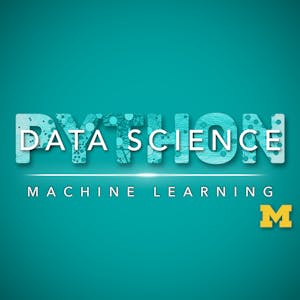Applied Machine Learning in Python
This course will introduce the learner to applied machine learning, focusing more on the techniques and methods than on the statistics behind these methods. The course will start with a discussion of how machine learning is different than descriptive statistics, and introduce the scikit learn toolkit through a tutorial. The issue of dimensionality of data will be discussed, and the task of clustering data, as well as evaluating those clusters, will be tackled. …
Applied Machine Learning in Python
This course will introduce the learner to applied machine learning, focusing more on the techniques and methods than on the statistics behind these methods. The course will start with a discussion of how machine learning is different than descriptive statistics, and introduce the scikit learn toolkit through a tutorial. The issue of dimensionality of data will be discussed, and the task of clustering data, as well as evaluating those clusters, will be tackled. Supervised approaches for creating predictive models will be described, and learners will be able to apply the scikit learn predictive modelling methods while understanding process issues related to data generalizability (e.g. cross validation, overfitting). The course will end with a look at more advanced techniques, such as building ensembles, and practical limitations of predictive models. By the end of this course, students will be able to identify the difference between a supervised (classification) and unsupervised (clustering) technique, identify which technique they need to apply for a particular dataset and need, engineer features to meet that need, and write python code to carry out an analysis. This course should be taken after Introduction to Data Science in Python and Applied Plotting, Charting & Data Representation in Python and before Applied Text Mining in Python and Applied Social Analysis in Python.
Describe how machine learning is different than descriptive statistics
Create and evaluate data clusters
Explain different approaches for creating predictive models
Build features that meet analysis needs
Syllabus
Syllabus - What you will learn from this course
Week 1
Module 1: Fundamentals of Machine Learning - Intro to SciKit Learn
This module introduces basic machine learning concepts, tasks, and workflow using an example classification problem based on the K-nearest neighbors method, and implemented using the scikit-learn library.
Week 2
Module 2: Supervised Machine Learning - Part 1
This module delves into a wider variety of supervised learning methods for both classification and regression, learning about the connection between model complexity and generalization performance, the importance of proper feature scaling, and how to control model complexity by applying techniques like regularization to avoid overfitting. In addition to k-nearest neighbors, this week covers linear regression (least-squares, ridge, lasso, and polynomial regression), logistic regression, support vector machines, the use of cross-validation for model evaluation, and decision trees.
Week 3
Module 3: Evaluation
This module covers evaluation and model selection methods that you can use to help understand and optimize the performance of your machine learning models.
Week 4
Module 4: Supervised Machine Learning - Part 2
This module covers more advanced supervised learning methods that include ensembles of trees (random forests, gradient boosted trees), and neural networks (with an optional summary on deep learning). You will also learn about the critical problem of data leakage in machine learning and how to detect and avoid it.
FAQ
When will I have access to the lectures and assignments?
Access to lectures and assignments depends on your type of enrollment. If you take a course in audit mode, you will be able to see most course materials for free. To access graded assignments and to earn a Certificate, you will need to purchase the Certificate experience, during or after your audit. If you don't see the audit option:
What will I get if I subscribe to this Specialization?
When you enroll in the course, you get access to all of the courses in the Specialization, and you earn a certificate when you complete the work. Your electronic Certificate will be added to your Accomplishments page - from there, you can print your Certificate or add it to your LinkedIn profile. If you only want to read and view the course content, you can audit the course for free.
What is the refund policy?
If you subscribed, you get a 7-day free trial during which you can cancel at no penalty. After that, we don’t give refunds, but you can cancel your subscription at any time. See our full refund policy.
Is financial aid available?
Yes. In select learning programs, you can apply for financial aid or a scholarship if you can’t afford the enrollment fee. If fin aid or scholarship is available for your learning program selection, you’ll find a link to apply on the description page.
Reviews
the content of videos , quiz and exercise all work extremely well together towards the stated goal of the course i.e. to give the learner a good over view of how to apply ML theories into action
This course is ideally designed for understanding, which tools you can use to do machine learning tasks in python. However, for deep understanding ML algorithms you should take more math based courses
This is an excellent course. The programming exercises can be solved only when you get the basics right. Else, you will need to revisit the course material. Also, the forums are pretty interactive.
great experience and learning lots of technique to apply on real world data, and get important and insightful information from raw data. motivated to proceed further in this domain and course as well.
Start your Free Trial
Self paced
262,019 already enrolled
4.6stars Rating out of 5 (8,067 ratings in Coursera)
Go to the Course
